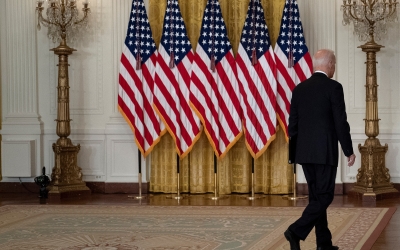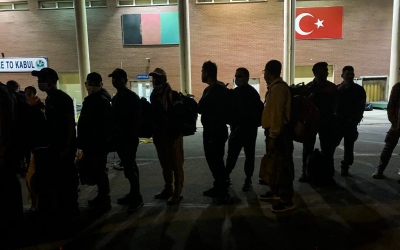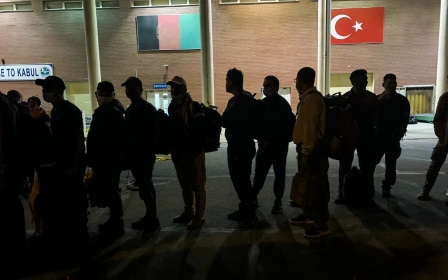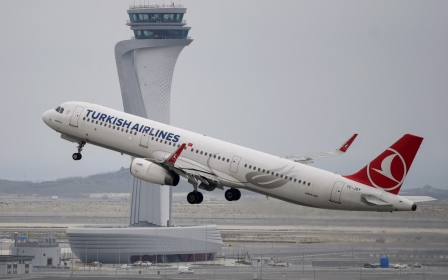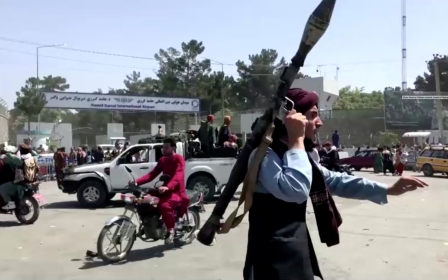Afghanistan: Orientalism and racist allusions at core of Biden's speech
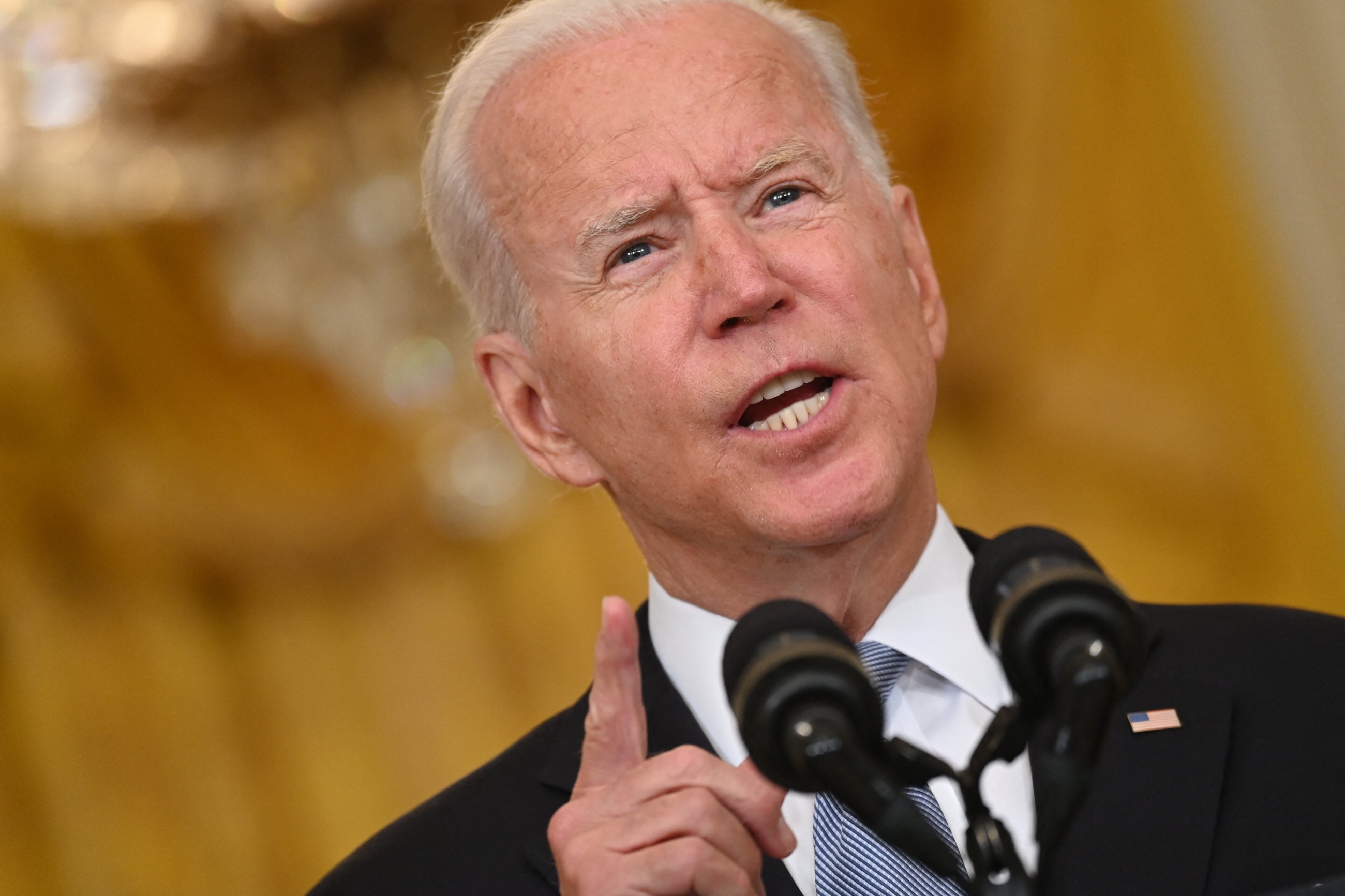
After close to 20 years of war, $2.26 trillion of military expenditure (or $300m per day for two decades) and the loss of hundreds of thousands of lives, the Taliban walked into Kabul on Sunday and took over the presidential palace without firing a single shot.
The triumph over Kabul came just weeks after the US military pulled out of the country.
The surreal events prompted a collective meltdown in the US as pundits, politicians and the public at large gasped at the speed at which steep American investment had crumbled in real-time.
On Monday, US President Joe Biden broke his silence and addressed the nation. In his address, Biden attempted to both clarify his decision to pull troops out and address some of the criticisms levelled at his administration for the "hasty manner" in which the operation had been conducted.
He acknowledged the US had underestimated the resolve of the Taliban to take over the country. Yet Biden tried to evade America's responsibility for its role in destabilising the country and obfuscate America's use of "values" in pursuing intervention in other nations. Ultimately he laid the blame squarely on the people and leadership of Afghanistan for refusing to fight for their own future by invoking racialised and orientalist tropes of the country.
His speech was the very embodiment of American foreign policy that has defined the US role in Afghanistan, the Middle East, Latin America, and elsewhere, since World War II.
But it also culminated in historic revisionism that revealed, at its core, a deep-seated disdain for the Afghan people.
Here are five sections from his address that underline some of these issues:
1. "Our mission in Afghanistan was never supposed to have been nation-building. It was never supposed to be creating a unified, centralised democracy."
In his speech, Biden insisted the purpose of going into Afghanistan was to dismantle al-Qaeda and kill Osama Bin Laden over his role in the September 11 attacks in 2001. It was not America's role to reconstruct the country, he said.
According to the Special Inspector General for Afghanistan Reconstruction (SIGAR), since 2001 the US government has spent $145bn trying to rebuild the country's security forces, civilian government institutions, economy, and civil society.
Similarly, 18 years ago, the same Biden told the Senate Foreign Relations Committee that ignoring "nation-building" in Afghanistan would foment chaos.
"In some parts of the administration, nation-building is still a dirty phrase, but the alternative to nation-building is chaos, a chaos that churns out blood-thirsty warlords, drug traffickers, and terrorists," he said.
For decades, words like "democracy", "freedom" and the like have long been used by the US to justify their invasions.
To hear an American president, other than Donald Trump, admit "America First" above all else was also quite a novel feat.
2. "American troops cannot and should not be fighting in a war and dying in a war that Afghan forces are not willing to fight for themselves… We gave them every chance to determine their own future. What we could not provide them was the will to fight for that future."
Not only is the assertion that Afghans were unwilling to fight for their future hopelessly inaccurate, but it is also a tasteless lie. Marc Thiessen from the Washington Post described it as "libellous".
"For more than six years, the Afghan army bore the brunt of the fight - and with US support they succeeded in holding the Taliban at bay. It was only when Biden withdrew the US mission planning, intelligence and air support that had enabled them to succeed that Afghan forces were overwhelmed," Thiessen wrote.
Moreover, Biden appeared to use one set of facts to draw seemingly opposite conclusions. The US entered Afghanistan to topple the Taliban (for hosting Bin Laden). They didn't come at the behest of Afghans. In other words, the US dragged Afghans into a war that was not of their own making.
Since the removal of the Taliban in 2001, Afghans have remained occupied by the US for the past 20 years. Their gains have been regulated by the whims and interests of the US and its allies. Afghans did not have any choice in this.
With regards to Afghan soldiers defecting or refusing to fight against the Taliban, Biden knows that many Taliban also defected in 2001, following the invasion.
As one former fighter told New Yorker journalist Jon Lee Anderson in November 2001: "In America and other places, people have the idea that their countries are important to them. But in Afghanistan, the fighters don't have this notion, and the poverty here leads them to join whoever is powerful."
The US has long known that Afghan police were not respected by people either. One navy official described them as "the most hated institution" in Afghanistan.
In the 2019 Afghan elections, public confidence was so low that only 20 percent of people voted for what would become a fragile Afghan government.
Even as some Americans have expressed outrage at the manner in which this pull-out was arranged, few questions are being asked about the fundamentally medieval invasion of the country in the first place.
For the record, there was never a vote in Congress to start a war in Afghanistan specifically, only a vote for a broad resolution that gave the military the go-ahead to hunt down those responsible for 9/11. It passed 420-1. There was also never a UN Security Council Resolution endorsing the mission.
3. "How many more generations of America’s daughters and sons would you have me send to fight Afghanistan’s civil war when Afghan troops will not? How many more lives, American lives, is it worth, how many endless rows of headstones at Arlington National Cemetery?"
As is the standard with all American presidents (and most ordinary Americans, for that matter) the losses in Afghanistan are only really a story about America's loss of life, American sacrifice and American pain.
Biden made no mention of the number of Afghans who were killed, maimed or displaced by the war. There is no mention of the black sites of CIA ops where Afghans were detained and tortured - often for no reason.
There is no mention of the air strikes that routinely killed civilians or left daughters and sons without mothers and fathers. The US had a knack for incinerating wedding parties. No mention of those either.
According to researchers from the Center for Civilians in Conflict and the Columbia Law School Human Rights Institute, the military rarely visited the sites in Afghanistan, Iraq or Syria, following claims that civilians had been killed by drone strikes. The study found that the US military visited 16 percent of 228 such sites between 2002-2015.
There was no mention of Guantanamo Bay where 40 "forever prisoners" are still in jail. Since the advent of the War on Terror, some 800 people were imprisoned in Guantanamo, with more than 75 percent never being charged with a crime.
In September 2020, Brown University's Costs of War Project said that at least 37 million people, including 5.3 million in Afghanistan, were forced to flee their homes in the eight wars that the American army launched or took part in since 2001.
Yet according to Monday's speech, it was all about American lives. Biden said he feels remorse about the efforts of beloved American veterans, American NGOs and humanitarians (salaried, no doubt) who had to leave Afghanistan behind.
4. "The events we're seeing now are sadly proof that no amount of military force would ever deliver a stable, united, secure Afghanistan, as known in history as the graveyard of empires… Our decades-long effort to overcome centuries of history and permanently change and remake Afghanistan was not, and I wrote and believed it never could be."
It was remarkable that Biden's team gave their consent to his orientalist and racist allusions of America's well-intentioned failure to correct an intractable centuries-old problem in a faraway land.
It was also equally remarkable that Biden would narrate that "no amount of military force would ever deliver a stable, united, secure Afghanistan" with a straight face, given America's periodical use of military force to achieve precisely those goals. But even here, the assertion for reducing military force is a little more than a ruse for upgrading military options, tried and tested in Afghanistan.
In other words, Biden doesn't mean replacing military force with hugs and kisses; he means replacing soldiers with upgraded technological hardware.
5. "We'll continue to speak out for the basic rights of the Afghan people, of women and girls, just as we speak out all over the world."
Much of the concerns in the western press over the past few days have revolved around the extent to which the gains of the past 20 years in women's empowerment will be upended by the Taliban's takeover of the country.
While the Taliban have insisted otherwise, claiming to have shifted their position on girls' education and women in public spaces, including the workplace, it is too early to tell if they will resort to their previous brutalities.
But even then, the almost singular focus on the fate of women and education for girls, as the Taliban take over once more, ignores a litany of facts.
For starters, the marginalisation of women in Afghanistan pre-dated the Taliban.
Moreover, the current hysteria over "saving Afghan women" as the Taliban takes over belies how "saving Afghan women" was a specific marketing ploy to gain support in pursuing a war in Afghanistan in the first place.
In other words, "saving Afghan women" was weaponised to detract from America's illegal war on terror, its ambush of international institutions and the bypassing of human rights in Afghanistan and elsewhere.
Here is what First Lady Laura Bush told the American nation on 17 November 2001: "Because of our military gains in much of Afghanistan, women are no longer imprisoned in their home. They can listen to music and teach their daughters without fear of punishment … the fight against terrorism is also a fight for the rights and dignity of women."
Now as Biden has conceded, this was always a war to destroy al-Qaeda, kill Bin Laden and further US interests. It was not the first step in demilitarising or pursuing redistributive justice, or ending the military-industrial complex that dominates US politics. It was just another project for the American empire. And now they are moving to the next one.
You can read the speech in full here.
The views expressed in this article belong to the author and do not necessarily reflect the editorial policy of Middle East Eye.
Azad Essa is a senior reporter for Middle East Eye based in New York City. He worked for Al Jazeera English between 2010-2018 covering southern and central Africa for the network. He has written for the Washington Post, Foreign Policy and others. He is the author of the 'The Moslems are Coming' (Harper Collins India) and 'Zuma's Bastard' (Two Dogs Books). He was a visiting Nieman Fellow in 2019.
Middle East Eye delivers independent and unrivalled coverage and analysis of the Middle East, North Africa and beyond. To learn more about republishing this content and the associated fees, please fill out this form. More about MEE can be found here.


